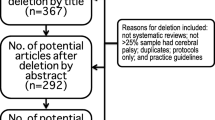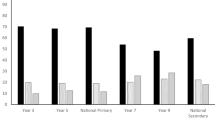Abstract
Purpose To compare the educational levels of clients with brain injury, acquired during working age who received neurorehabilitation between 2002 and 2013 with two governmental reports examining educational levels of attainment in the general public. Methods Results from national skills numeracy and literacy assessments undertaken by clients with acquired brain injury (ABI) on admission to the centre between 2002 and 2013 were compared with the results from two national reports examining educational attainment in people in further education with and without long term disabilities, as part of an ongoing review/audit of the service. Results ABI resulted in lower levels of literacy and numeracy compared to the general public; women with ABI performed more poorly on the numeracy assessment compared to the literacy assessment; and clients with ABI had a disproportionately reduced level of literacy, resulting in a more even pattern of attainment on the numeracy and literacy assessments whereas the general public scored more highly on the literacy assessment. Conclusion ABI adversely affects both literacy and numeracy skills. It is important that the effect of ABI on numeracy and literacy is considered during vocational counselling and rehabilitation as a person’s premorbid education level may be an overestimation of their abilities.
Similar content being viewed by others
References
Bruns J Jr, Hauser WA. The epidemiology of traumatic brain injury: a review. Epilepsia. 2003;44(Suppl 10):2–10.
Consensus conference. Rehabilitation of persons with traumatic brain injury. NIH Consensus Development Panel on Rehabilitation of Persons with Traumatic Brain Injury. JAMA. 1999;282:974–983.
Dikmen S, Machmer J, Temkin N, McLean A. Neuropsychological recovery in patients with moderate to severe head injury: 2 year follow-up. J Clin Exp Neuropsychol. 1990;12:507–19.
Ip RY, Doran J, Schentag C. Traumatic brain injury: factors predicting return to work to school. Brain Inj. 1995;9:517–32.
Yasuda S, Wehman P, Targett P, Cifu D, West M. Return to work for persons with traumatic brain injury. Am J Phys Med Rehabil. 2001;80:852–64.
Hawley C, Ward A, Magnay A, Mychalkiw W. Return to school after brain injury. Arch Dis Child. 2004;89(2):136–42.
Jones A, Johnson D. A study of the educational provision for head-injured children. Br J Spec Educ. 1994;21:113–7.
Asikainen I, Kaste M, Sarna S. Patients with traumatic brain injury referred to a rehabilitation and reemployment programme: social and professional outcome for 508 Finnish patients 5 or more years after injury. Brain Inj. 1996;10(12):883–99.
Gollaher K, High W, Sherer M, Bergloff P, Boake C, Young ME, Ivanhoe C. Prediction of employment outcome one to three years following traumatic brain injury (TBI). Brain Inj. 1998;12:255–63.
Greenspan AI, Wrigley JM, Kresnow M, Branche-Dorsey CM, Fine PR. Factors influencing failure to return to work due to traumatic brain injury. Brain Inj. 1996;10:207–18.
Cifu DX, Keyser-Marcus L, Lopez E, Wehman P, Kreutzer JS, Englander J, High W. Acute predictors of successful return to work 1 year after traumatic brain injury: a multicenter analysis. Arch Phys Med Rehabil. 1997;78(2):125–31.
Kesler SR, Adams HF, Blasey CM, Bigler ED. Premorbid intellectual functioning, education, and brain size in traumatic brain injury: an investigation of the cognitive reserve hypothesis. Appl Neuropsychol. 2003;10(3):153–62.
Ewing-Cobbs L, Barnes M. Linguistic outcomes following traumatic brain injury in children. Semin Pediatr Neurol. 2002;9:208–16.
Ylvisaker M, Szekeres F. Metacognitive and executive impairments in head-injured children and adults. Top Lang Disord. 1989;9:34–49.
Gruber O, Indefrey P, Steinmetz H, Kleinschmidt A. Dissociating neural correlates of cognitive components in mental calculation. Cereb Cortex. 2001;11(4):350–9.
Department for Business Innovation and Skills (2012) The 2011 skills for life survey: A survey of literacy, numeracy and ICT levels in England. BIS research paper number 81. Department for Business Innovation and Skills, London. Retrieved on 20 December 2013 from www.bis.gov.uk/…/11-1367-2011-skills-for-life-survey-findings.pdf.
Department for Education and Skills (2003) The skills for life survey. A national needs and impact survey of literacy, numeracy and ICT skills, Norwich: HMSO. Retrieved on 20 December 2013 from http://www.dcsf.gov.uk/research/data/uploadfiles/RR490.pdf.
Dikmen SS, Temkin NR, Machamer JE, Holubkov AL, Fraser RT, Winn HR. Employment following traumatic head injuries. Arch Neurol. 1994;51:177–86.
Ponsford JL, Olver JH, Curran C, Ng K. Prediction of employment status 2 years after traumatic brain injury. Brain Inj. 1995;9(1):11–20.
Sumowski JF, Chiaravalloti N, Krch D, Paxton J, Deluca J. Education attenuates the negative impact of traumatic brain injury on cognitive status. Arch Phys Med Rehabil. 2013;94(12):2562–4.
Stern Y. What is cognitive reserve? Theory and research application of the reserve concept. J Int Neuropsychol Soc. 2002;8(3):448–60.
Gerberich SG, Gibson RW, Fife D, Mandel JS, Aeppli D, Le CT, Maxwell R, Rolnick SJ, Renier C, Burlew M, Matross R. Effects of brain injury on college academic performance. Neuroepidemiology. 1997;16(1):1–14.
Moore D, Ashman T, Cantor J, Krinick R, Spielman L. Does gender influence cognitive outcome after traumatic brain injury? Neuropsychol Rehabil. 2010;20(3):340–54.
Haas JF, Cope DN, Hall K. Premorbid prevalence of poor academic performance in severe head injury. J Neurol Neurosurg Psychiatry. 1987;50(1):52–6.
Dawis RL, Lofquist LH, Weiss DJ. A theory of work adjustment: a revision. Minn Stud Vocat Rehabil. 1968;23:1–14.
Buys N, Rennie J. Developing relationships between vocational rehabilitation agencies and employers. Rehabil Couns Bull. 2001;44(2):95–103.
Parente R, Stapleton M. Vocational evaluation, training, and job placement after traumatic brain injury: problems and solutions. J Vocat Rehabil. 1996;7(3):181–91.
Conflict of interest
There are no conflicts of interest including financial, consultant, institutional, and other relationships that might lead to bias or a conflict of interest. Although the author is employed by QEF Neuro Rehabilitation Services this research is funded externally by three charitable trusts (The Wates Foundation, the Wates Family Enterprise Trust and the PF Charitable Trust).
Author information
Authors and Affiliations
Corresponding author
Rights and permissions
About this article
Cite this article
Foy, C.M.L. Educational Attainment and Ability in Young Adults Following Acquired Brain Injury. J Occup Rehabil 25, 394–402 (2015). https://doi.org/10.1007/s10926-014-9549-y
Published:
Issue Date:
DOI: https://doi.org/10.1007/s10926-014-9549-y




